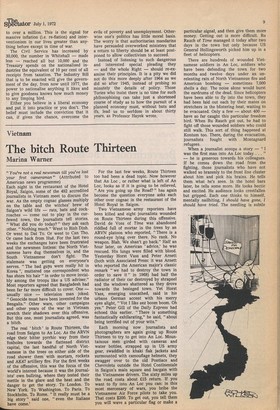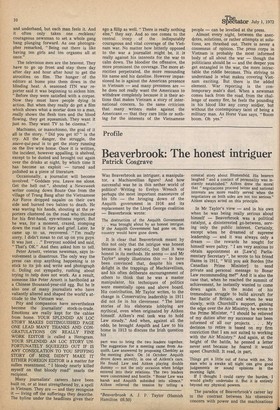Vietnam
The bitch Route Thirteen
Marina Warner
"You're not a real newsman till you've lost your first cameraman" (Attributed to American news programme) Each night in the restaurant of the Hotel Royal, Saigon, some of the 492 accredited journalists in Vietnam meet to discuss the war. As the empty cognac glasses multiply on the table and the witches' brew of Saigon's wild life — rats, bats and cockroaches — come out to play in the curfewed town, the journalists tell stories. "What did you do today?" they ask each other. "Nothing much." Went to Binh Dinh. Or went to Dat To. Or went to Can Tho. Or came back from Hue. For the last two weeks the exchanges have been frustrated and the newsmen listless: the North Vietnamese have dug themselves in, and the South Vietnamese don't fight. The stalemate was getting on everyone's nerves. "The bad guys were really hit in Korea ", muttered one correspondent who has shorn his hair "in order to move invisibly among the troops like a US adviser." Most reporters agreed that Bangladesh had been far far more difficult to cover. One — usually nice — television man joked: "Genocide must have been invented for the Bengalis." Other wars, other campaigns and other years of the war in Vietnam stretch their shadows over this offensive. But this one, most journalists agreed, was a bitch.
The real 'bitch' is Route Thirteen, the road from Saigon to An Loc. As the ARVN edge their bitter pyrrhic way from their foxholes towards the flattened district capital, the last handful of North Vietnamese in the trees on either side of the road shower them with mortars, rockets and AK47 artillery fire. For the first weeks of the offensive, this was the focus of the world's interest because it was the journalists' own bullring, where they tested their mettle in the glare and the heat and the danger to get the story. To London. To New York. To Washington. To Paris. To Stockholm. To Rome. "It really must be a big story" said one, "even the Italians have come.' For the last few weeks, Route Thirteen too had been a dead topic. Now however that An Loc , or rather what is left of An Loc, looks as if it is going to be relieved, "Are you going up the Road?" has again become the question everyone asks each other over cognac in the restaurant of the Hotel Royal in Saigon.
Two Vietnamese army reporters have been killed and eight journalists wounded on Route Thirteen during this offensive. David de Voss of Time was abandoned riddled full of mortar in the trees by an ARVN platoon who reported, "There is a round-eye lying over there. No rank. No weapon. Blah. We shan't go back." Half an hour later, on American 'advice,' he was rescued. His lungs were filled with blood. Yesterday Horst Vass and Peter Arnett (both with Associated Press: it was Arnett who reported the American major's classic remark "we had to destroy the town in order to save it" in 1968) had half the radiator of their car destroyed by shrapnel and the windows shattered as they drove towards the besieged town. Yet Horst Vass, emerging unscathed, said in his urbane German accent with his merry eyes alight, " Vot I like eez boom boom. Oh yes." Peter Gill of the Daily Express had echoed this earlier. "There is something fantastically exhilarating," he said, "about being terrified out of your wits."
Each morning now journalists and photographers are again going up Route Thirteen to try to get into An Loc. Mountainous men girded with cameras and water bottles, strapped up in US army gear, swaddled in khaki flak jackets and surmounted with camouflage helmets, they swagger over to the old Pontiacs and Chevrolets outside the Hotel Continentale in Saigon's main square and bargain with the Vietnamese drivers. The sixty miles up the road costs about £15 return. If you want to fly into An Loc you can: in this most mercenary of wars, you bribe the Vietnamese Air Force pilots to take you. That costs $200. To get out, you tell them you will wave a particular flag or make a particular signal, and then give them more money. Getting out is more difficult. Ru Rauch of Time managed it today after two days in the town but only because US General Hollingsworth picked him up in a fleet of helicopters.
There are hundreds of wounded Vietnamese soldiers in An Loc, soldiers who have been defending the town for two months and twelve days under an unrelenting rain of North Vietnamese fire and American bombing — sometimes 7,000 shells a day. The noise alone would burst the eardrums of the dead. Since helicopters have been able to fly into the town, they had been laid out each by their mates on stretchers in the blistering heat, waiting to be evacuated. Only a few — about 400 — have so far caught this particular freedom bird. When Ru Rauch got out, he had to fight off those wounded soldiers who could still walk. This sort of thing happened at Kontum too. There, during the evacuation, journalists fought with Montagnard refugees.
When a journalist scoops a story — "I was the first man into An Loc today . — he is generous towards his colleagues. If he comes down the road from the fighting, those journalists who have not walked so brazenly to the front line cluster about him and pick his brains. He tells them what he's seen. In the hotel bars later, he tells some more. He looks hectic and excited. He audience looks crestfallen but gripped. Each one thinks to himself, mentally nailbiting, I should have gone, I should have tried. The needling is subtle and underhand, but each man feels it. And it often only takes one reckless/ courageous newsman to set a whole gang bang plunging forward. As one photographer remarked, "Being out there is like having ten girls and ten orgasms all at once."
The television men are the bravest. They have to go up front and stay there day after day and hour after hour to get the atrocities on film. The hunger of the editors at home pins them down in the blinding heat. A seasoned ITN war reporter said it was beginning to sicken him. "Before they were satisfied with a corpse. Now they must have people dying in action. But when they really do get a film which shows what a mortar does to a man, really shows the flesh torn and the blood flowing, they get squeamish. They want It just so. They want TV to be cinema."
Machismo, or masochismo, the goal of it all is the story. "Did you get it?" is the cry. All the danger, the struggle, the sauve-qui-peut is to get the story running on the live wire home. Once it is written, the incident, however appalling, is shelved, except to be dusted and brought out again over the drinks at night, by which time it has become an exploit — turned and polished as a piece of literature.
Occasionally, a journalist will become involved. " Goddam you. Leave me alone. Get the hell out ", shouted a Newsweek writer coming down Route One from the village of Trang Bang after the Vietnamese Air Force dropped napalm on their own side and burned two babies to death. He was waving his hands, shouting at the reporters clustered on the road who thirsted for his first-hand, eye-witness report. But he was, for a moment, crazed, stomping down the road in fury and grief. Later, he came up to us, recovered. "I'm really sorry. I didn't mean to cut up on you guys. It was just. . ." Everyont nodded and said, " That's OK." And then asked him to tell.
Peter Arnett, veteran newsman, says involvement is disastrous. The only way the press can stop anything happening is to stick to its job and write and photograph it. Doling out sympathy, rushing about trying to help does not work. As a result, someone like Peter Arnett is hardboiled as a Chinese thousand-year-old egg. But he Is also one of many journalists who have valiantly altered and shaped the world's attitude to the Vietnam war.
Pity and compassion have nevertheless become the journalists' stock-in-trade. Emotions are really kept for the cables from home. YOUR SPLENDID AN LOC STORY MAKES DISTINGUISHED PAGE ONE LEAD MANY THANKS AND CONGRATULATIONS ON REALLY FINE WORK EDITOR is called a Herogram. YOUR SPLENDID AN LOC STORY UNFORTUNATELY SQUEEZED OUT IF IS ANY CONSOLATION TO YOU SPIFFING STORY OF MINE DIDN'T MAKE IT EITHER FOREIGN EDITOR is a matter for sullen resentment. "I bloody nearly killed myself on that bloody road" snarls the recipient.
Many journalists' careers have been built on, or at least strengthened by, a spell in Vietnam. They are — and they recognise it — living off the sufferings they describe. The byline under the headlines gives their ego a fillip as well. "There is really nothing else," they say. And so one comes to the central irony of the indisputably courageous and vital coverage of the Vietnam war. No matter how bitterly opposed to the war a journalist might be, it is really against his interests for the war to calm down. The bloodier the offensive, the more prominent the coverage. The more atrocities perpetrated, the more resounding his name and his dateline. However impassioned he is against the American presence in Vietnam — and many pressmen are — he does not really want the Americans to withdraw completely because it is their actions that makes Vietnam a story of international concern. So the same criticism that many writers make against the Americans — that they care little or nothing for the interests of the Vietnamese people — can be levelled at the press.
Almost every night, between the anecdotes, solutions, or rather attempts at solutions, are thrashed out. There is never a consensus of opinion. The press corps in Vietnam is probably the most informed body of all about the war — though the politicians should be — and the deeper you get entangled in the war, the more intractable the riddle becomes. This striving to understand is what makes covering Vietnam exciting. But there is the added element. War reporting is the contemporary male's duel. When a newsman comes back from the road, from the challenge of enemy fire, he feels the pounding in his blood like any corny soldier, but without the contemporary taint of being a military man. As Horst Vass says, "Boom boom. Oh yes."























































 Previous page
Previous page